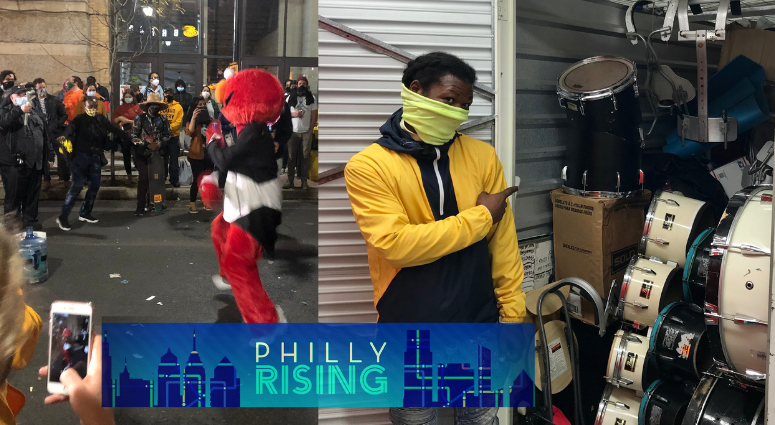
PHILADELPHIA (KYW Newsradio) -- If you have been paying attention to U.S. election news on Twitter, Facebook or Instagram, you have probably seen videos of someone in a big, red, hard-to-miss Elmo costume leading a drumline through Philadelphia streets.
You might hear them from afar in South Philly. And if you're lucky, you may even stumble upon one of their spontaneous performances -- always lively, with the heart of the drumline constant.
Tony Royster is the brain and soul behind "Philly Elmo" and Positive Movement Entertainment. While many are familiar with the social media sensation, few know the background of the group or their message.
“Our pledge is: We strive to keep positive minds, to decrease negative reactions, to bring unity to our community, and enjoy life abundantly, avoiding negativity," Royster said. "Why do we do this? To bring smiles to the hearts of our neighbors and to be role models to others."
Most of the time, the group’s goal is to simply show up to where the crowd is, but sometimes that turns into something bigger -- earning them views and popularity around the world.
“When we went viral, I did not wanna be on TV,” Royster said.
For him, it’s not just about following the crowd and the cheers, it’s also about following the passion.
“A big reason why I started my own team -- I was born in the projects, in the heart of negativity. The drill team actually saved me,” he said. “That was my (escape) from just being outside, selling drugs or getting into trouble.”
At the core of PME is a question: "Who you rockin' wit'?"
Royster says the drumline provides an alternative: "PME, who you rockin' wit'? Put down the guns, 'cause they are whack. I said it’s killing more people, and it’s mainly black."
Royster, who says he’s been playing drums since he was a toddler, says he felt that he could help keep other young people out of trouble by giving them a healthy outlet for their energy and creativity.
“I said, maybe it’s other people that could benefit the same way I did. They probably just don’t have those outlets," Royster said.
"They took the music programs out of the schools and really don’t have a lot of activities at the Boys and Girls Club. I said, this would really be a great opportunity for me to give back. You can really help somebody instead of just looking. Bring somebody up with you."
He says all of the donations the group receives from the community, onlookers, and paid performances are funnelled back into the organization for snacks and food for the drummers, uniforms and equipment.
And he teaches the young people he works with another set of invaluable skills. In addition to sharing his instrumental talents, he also teaches them entrepreneurial and marketing skills in the process.
“We basically self promote when we march through the community," he said. "On the back of the card, we’re going to put all of the things that we know how to do. So, as we’re passing the cards out, promoting the drill team, we’re also promoting the work that we can do too.”
He says, though the needs of the drummers are high, their efforts are not based on monetary gain.
“It’s not all about the money, even though they definitely need it. It’s also about building connections. We definitely work with you," Royster said.
As PME gained more experience with private performances, he says their prices began to reflect their worth, which has gotten some pushback from customers.
“Right now, we’re saving to get a tour bus. Equipment, it’s very expensive. Some money goes to saving. We need uniforms. Everything goes to the drill team,” he said.
Royster acknowledges that, despite the challenges, including his personal ones, what keeps him going is the big picture.
“I did get my clearances, but I don’t have a diploma, which is holding me back,” he said.
Royster, who dropped out of school, is now taking classes to earn his high school diploma, which he hopes to earn in 2021. He believes those credentials will help open other doors for him. He says he is considering becomming a school teacher.
For now, in addition to his class work, he’s dedicated full time to PME.
“A lot of times it gets overwhelming -- not having the money, not having people. Every weekend, I’m struggling, trying to figure out: Who’s going to come? How am I going to get the equipment fixed? Is everything together? Sometimes it’s very stressful, but I know in the long run, it’s going to pay off -- and not just for me but for others."
PME has been featured in two documentaries released this year. Royster hopes that the clout they gain from the exposure will help him continue to build the group.
